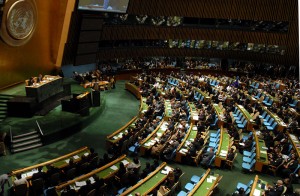Although it was the United Nations vote that made Israel possible in 1947, since that time the organization has become extremely anti-Israel. UN resolutions over the years have been heavily weighted against Israel. From 1947 until 1989, there were 321 General Assembly resolutions in condemnation of Israel. During this same period there were no resolutions condemning any Arab state or the PLO. During this period there were also 49 Security Council resolutions condemning Israel and none condemning Arab states or the PLO. On the average, the UN still passes 30 anti-Israel resolutions each year.
On June 9, 1991, a Jerusalem Post editorial marveled that although Israel was only one-thousandth of the world’s population, she had managed to occupy 30 percent of the UN Security Council meetings, and to be the subject of a third of its resolutions. The editorial went on to say that since the establishment of the UN, that organization has spent more time and energy seeking to condemn and de-legitimize Israel than it has spent on any other agenda item.
The UN has no scruples at meddling in Israel’s internal affairs. After Israel declared Jerusalem its capital in 1980, the Security Council adopted Resolutions 476 and 478. These resolutions called for all member states maintaining their diplomatic missions in Jerusalem to withdraw them. The nations responded and virtually all missions were transferred to Tel Aviv.
On November 10, 1975, the anniversary of the infamous Kristallnacht in Germany, the UN chose to pass its resolution number 3379 against Israel. This resolution which was drafted ostensibly to combat racism, declared that “Zionism is a form of racism and racial discrimination.” This resolution, basically declaring Zionism illegal, was not rescinded until December 16, 1991.
UN HYPOCRISY
Although Israel is one of the older members of the UN, she has remained as the only member state excluded from serving on the Security Council. This is especially odd since Syria, a widely known “rogue state,” is presently serving on that council. One European diplomat quipped that Israel is “the only permanent non-member of the council.”
The hypocrisy of the UN is clearly seen in its failure to censure radical Muslim nations such as Syria, when 20,000 of its citizens were slaughtered at Hama in 1982, or when, contrary to the first Geneva Convention, Egypt in 1966, and Iraq in 1988, both used
poison gas.
There has been much discussion in the UN and among the nations of the world in regard to UN resolutions 242 and 338. These resolutions were passed by the UN immediately after Israel’s wars of 1967 and 1973. Both have to do with establishing secure borders. There is hardly a border on earth that has not been established in some way by war. Traditionally, the loser aggressor nations have to pay a big price in territory lost for their aggression. That is true in every place on earth except in Israel. In Israel, due to UN and world pressures, the aggressors are usually rewarded and Israel is forced to surrender territory won in order that aggressors may live to fight another day.
Resolution 242 calls for Arab nations to end their state of belligerency in regard to Israel. It calls for Israel to withdraw from territories, without specifying what territories or how much territory. According to the Near East Report of April 8, 1991, the wording “territories” and not “all territories” or “the territories” was deliberate. Israel was not expected to withdraw to its indefensible positions before the 1967 war.
Resolution 338, which was drafted after the 1973 war, was simply a call for the implementation of resolution 242. The Arab nations refuse to understand these resolutions according to their careful wordings, but insist that Israel withdraw from “all” territory conquered in these wars. It may be added that the Arab nations have made no effort to cease from their belligerency, but have in fact increased it. These resolutions have been the basis for virtually all modern peace negotiations in the Middle East.
After the Camp David Accord between Israel and Egypt in 1978, Israel withdrew from the Sinai. This amounted to over 90 percent of all land she had conquered in the wars. Israel paid a dear price for peace by surrendering her newly developed oil reserves, airfields, settlements and strategic depth. Yet, the Arab and UN cries for Israel to return more territory go on and grow louder with time.
UN OBSERVERS AND UN “IMPARTIALITY”
As Israel has traditionally surrendered territory, UN observers or UN forces are moved in. This was the case in previous surrenders of the Sinai by Israel. The problem with “impartial” UN forces is that they are seldom impartial. From 1948 to 1967, the UN Truce Supervision Organization utterly failed to prevent the infiltration of Palestinian terrorists into Israel. When Egypt’s President Nasser ordered the UN out of the Sinai as he prepared for the invasion of Israel in 1967, the organization promptly complied.
The UN in Lebanon has done similarly. When the Israeli forces routed the PLO out of Lebanon in 1982 they were horrified at what they found. They learned that the PLO had established its central training facility for young terrorists in a vocational school run by the UN Relief and Works Agency. Some 600 boys and girls ages 18-19 were being trained there to become PLO officers. The UNRWA staff was unable to give an explanation of the PLO’s presence there. In Israel’s recent Operation Defensive Shield, the Israelis were also amazed to find that in the Balata refugee camp, the UNRWA food storage areas had become munitions’ depots and weapons’ factories.
THE UN AND ARAB REFUGEES
Israel is consistently bashed by the media, the UN and the world’s leaders. A convenient area of bashing is the resettlement of Arab refugees from all her wars, particularly the war of 1948. This Palestinian refugee problem is a problem that cannot be solved. It cannot be solved precisely because Arab governments and the PLO will not allow it to be solved. It is too convenient to use as a political weapon against Israel.
Our world has seen millions of refugees. It is estimated that since World War II there have been over 40 million refugees in the world. Most of these refugees have been quickly resettled in other countries. Not so the Palestinians. The Arab countries immediately perceived the propaganda potential of these helpless people and they have been exploited for over half century for this purpose.
The Arab refugee problem was originally much the fault of Arab countries. During Israel’s war of Independence in 1948, Arab leaders advised Palestinians to flee the land until their invasion was complete. Great numbers complied, even over the objections of Jewish authorities. Thus the Palestinian refugee problem ensued.
UNRWA AN ARAB PROPAGANDA TOOL
The United Nations Relief and Works Agency (UNRWA) was founded as a temporary agency to help these Palestinian refugees. It is interesting that the director of the newly-formed UNRWA in 1951, John Blandford, Jr., stated that he expected the Arab governments to assume responsibility for relief operation by July 1952. Unfortunately, UNRWA was destined to become an almost permanent arm of a vicious Arab and Palestinian propaganda plan.
It has been calculated that the total number of Arab refugees after the 1948 war was 650,000, with some estimates as low as 472,000. Soon, however, UNRWA began to speak of numbers exceeding one million. Later it was disclosed that the lists had been greatly padded by unreported deaths and forged ration cards. These figures continued to be inflated until they were speaking of two million and even three million refugees. Now as a result of the peace process and Arab propaganda campaigns, the PLO is demanding that these refugees be returned to the land. Of course, such a move would spell the end of the sovereign state of Israel.
What has been cleverly obscured in all the clamor concerning refugees, is that an almost parallel expulsion of Jews from Arab lands occurred in 1948 at the time Israel was becoming a state. Some 820,000 Jewish refugees fled or were forced out of Arab countries, in most cases leaving all their wealth behind. About 586,000 of these refugees fled to Israel and they were quickly absorbed by the newly formed nation.
It is doubly interesting that the UN now maintains two humanitarian agencies. UNRWA is dedicated to helping Palestinians with humanitarian assistance while UNHCR provides permanent solutions for other refugees by assisting governments. The Jerusalem Post sums it up by saying “With this, UNRWA admits its sister agency is in the business of solving refugee problems, while its job is to perpetuate one.” *
With each passing year the Palestinian refugee problem looms larger and larger. At the core of this problem is a cruel attitude of manipulation by the Arabs of their own people. Unfortunately, this problem continues to be exacerbated by the UN itself.
– Jim Gerrish
*The Jerusalem Post, April 15, 2002
Note: This article is an updated excerpt from the author’s book, Does God Play Favorites.
April, 2002
Picture credit Wikimedia Commons

